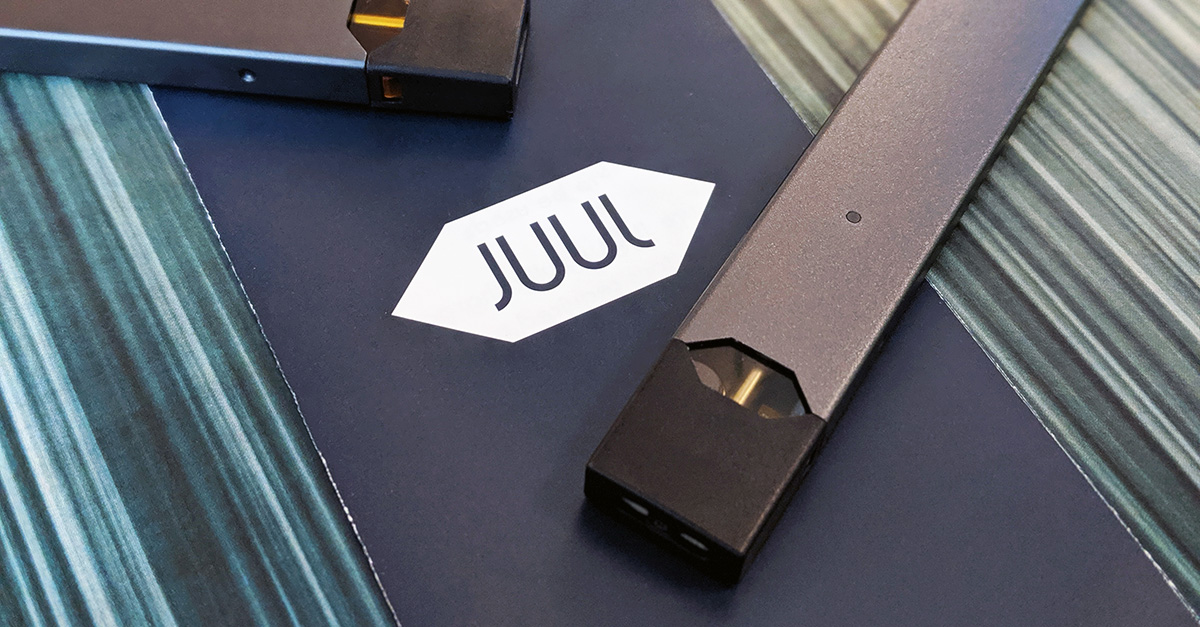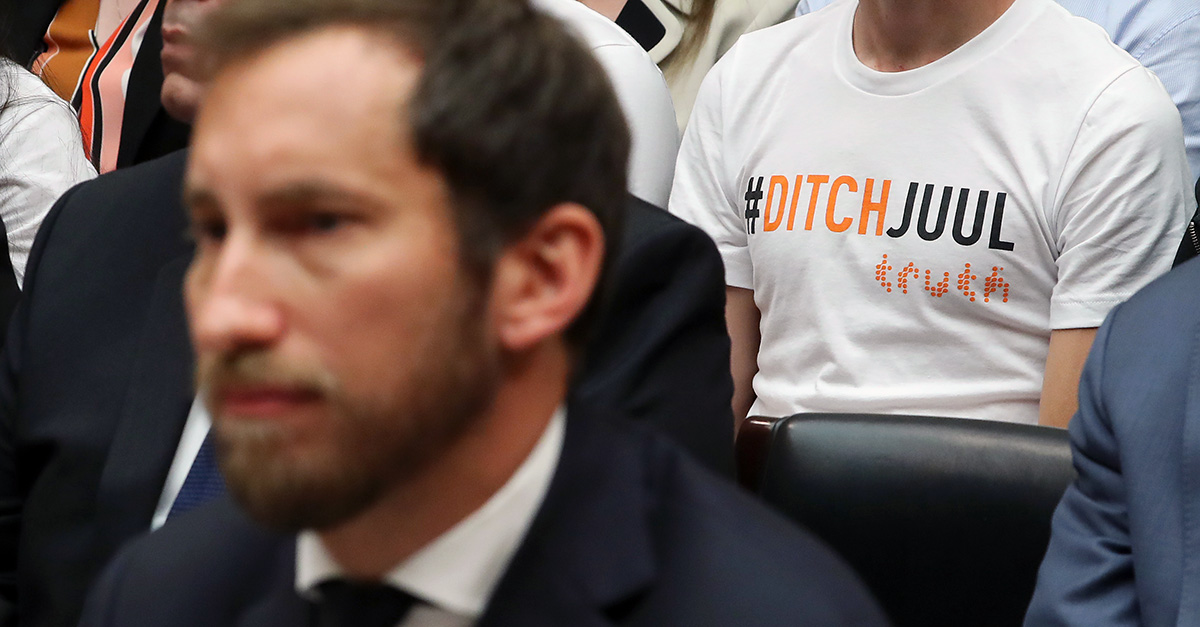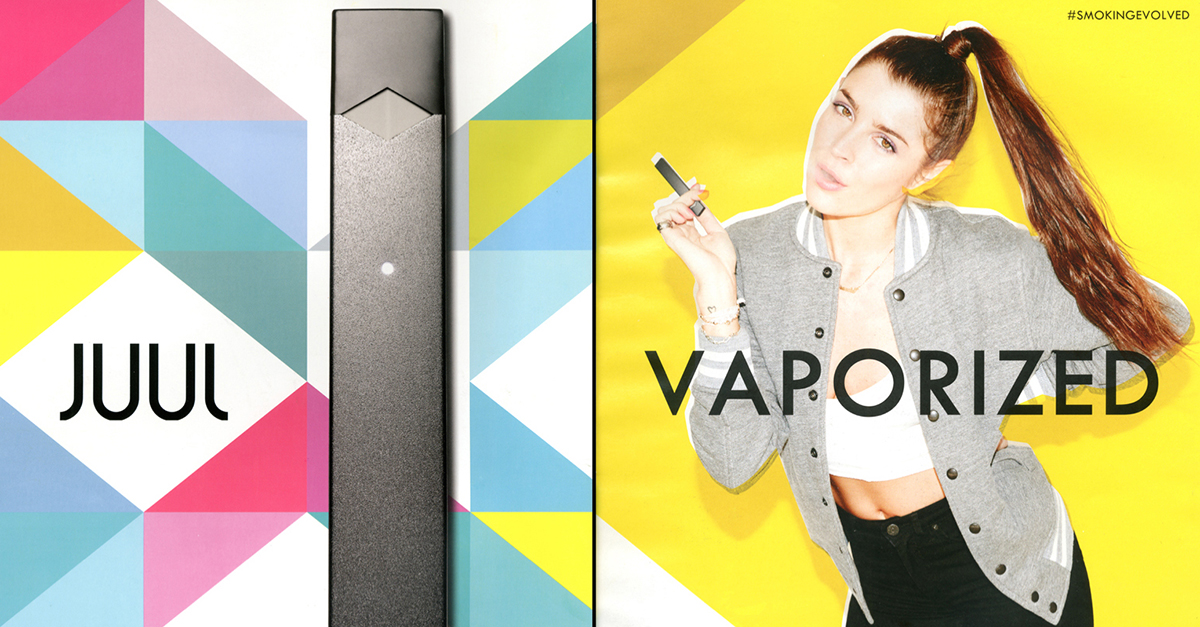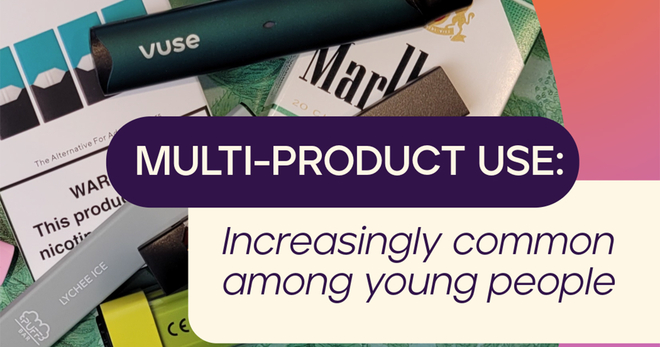The latest information on JUUL: 8 important things to know
There is so much important information that we don’t know about JUUL, including how it will impact the long-term health of its many young users.
This information gap exists because e-cigarettes on the market today are sold in a relatively unregulated environment and have not undergone a Food and Drug Administration review of their public health impact. JUUL has also not subjected its products to an independent, clinical investigation needed to substantiate claims that it helps smokers stop using cigarettes.
Here’s some of the latest information on the product from the newest research and reports, as well as the company’s own testimony and documents from Congressional hearings about JUUL’s role in the youth e-cigarette epidemic.

JUUL’s high nicotine content is driving an overall increase among e-cigarettes
amount of nicotine in a JUUL pod
JUUL’s nicotine content is one of the highest among e-cigarettes on the market. The amount of nicotine in one standard JUUL cartridge is roughly equal to the amount of nicotine in a pack of cigarettes, or about 200 puffs, according to the JUUL website.
JUUL, which launched in 2015 and owns three-quarters of the e-cigarette market, has driven much of the increase in nicotine content in e-cigarettes. The average nicotine concentration in e-cigarettes sold in U.S. retailers more than doubled from 2013 to 2018, according to a study by Truth Initiative and the Centers for Disease Control and Prevention.
Early nicotine use can harm brain development, alter nerve cell functioning and increase the risk of young people smoking cigarettes. In fact, young people who use e-cigarettes are four times more likely to go on to smoke cigarettes than their peers who do not vape.
Officials are investigating reports of seizures and severe respiratory illness
is JUUL causing seizures
The CDC recently announced that 38 states and a U.S. territory reported 530 cases of lung injury. In addition, Illinois officials were the first to report that a person who had been hospitalized with severe lung illness and recently used an e-cigarette had died. A total of seven cases of death have now been confirmed.
The FDA also launched an investigation into dozens of reported cases of seizures following e-cigarette use in April 2019. By August, the number of reported cases grew to 127. Acting FDA Commissioner Ned Sharpless said in a statement that the agency does not yet “have enough information to determine if e-cigarettes are causing these reported incidents,” but asked people to continue to submit reports.

JUUL programs targeted youth at school and summer camps
Does JUUL market to minors
JUUL programs targeted children as young as those in third grade by funding summer camps, visiting schools and paying community and church groups to distribute their materials, according to documents and testimony from Congressional hearings about JUUL’s role in the youth e-cigarette epidemic.
The hearings also included testimonies from two high school students and their mothers about a class presentation from a JUUL representative, supposedly focusing on addiction and wellness, who said JUUL was "totally safe." Marketing programs aimed at other groups including Native Americans and veterans were also uncovered during the hearings.
Few adults are using the product, even though JUUL claims they are the target market
who uses JUUL
JUUL says they are trying to reach adult smokers who want to quit combustible tobacco. These efforts appear to largely be unsuccessful – research from Truth Initiative shows that few adult smokers are using the product and even fewer are using it as a way to quit smoking.
Of the 15% of adult tobacco users who have tried JUUL, only about one-third used the product as a way to quit, according to the study published in Tobacco Control. Nearly as many — 32% — reported that they used JUUL because family, friends or colleagues use it.

People are looking for support to quit JUUL
how to quit vaping JUUL
More than 27,000 teens and young adults enrolled in a first-of-its-kind quit vaping program This is Quitting within just five weeks after Truth Initiative launched it in January.
Of the roughly 10,000 users who responded to assessment questions after two weeks, 61% said that they had reduced or stopped using e-cigarettes. That includes 46% of teens and young adults who reported reducing use, and 12% of teens and 16% of young adults who reported stopping altogether, according to a report published in Nicotine & Tobacco Research. Most respondents also indicated a desire for additional support, with nearly three-quarters responding that the program should be longer.
JUUL still sells one of young people’s favorite flavors in stores
most popular JUUL flavor
Just before the FDA announced proposed sales restrictions on flavored e-cigarettes, JUUL said that it would stop stocking some sweet and fruity flavors in retail stores and only sell them online. But while it removed some of the flavors that appeal most to youth, like mango and fruit, the company continued retail sales of mint, one of young people’s favorite flavors.
A Truth Initiative survey of more than 1,000 young people found that, among the youngest JUUL users between 12 and 17, 16% used the mint flavor the last time they used a JUUL, behind only fruit (26%) and mango (25%). For those between 18 and 21 years old, mint was the most popular flavor, with nearly a third — 32% — using mint the last time they vaped.
JUUL is investing heavily in lobbying
JUUL lobbying efforts
JUUL continues to block and prevent FDA regulations, investing more than $1 million in lobbying efforts in the second quarter of 2019 alone. It has also invested millions – more than $4 million so far – to try to beat a San Francisco ballot initiative to stop sales of e-cigarettes in the city.
Meanwhile, JUUL has failed to subject its products to the level of independent, clinical investigation needed to substantiate any claims of effective cessation, nor has the company applied to the FDA to be approved as a product to help smokers quit.
JUUL is looking more and more like Big Tobacco
Is JUUL owned by big tobacco
Many of the tactics JUUL has used – targeting youth and other vulnerable groups, investing in lobbying and trying to block regulation, to name a few – are straight from the tobacco industry playbook. On top of that, JUUL officially aligned itself with Big Tobacco when industry giant Altria purchased a 35% stake in the company in 2019. Altria may also join with Philip Morris International in a $200 billion merger, according to recent reports.
JUUL’s emulation of Big Tobacco appeared to happen from the beginning. In the early days of the company, JUUL’s design so closely resembled Marlboro’s logo that it resulted in a trademark infringement settlement with Philip Morris USA. Consequentially, JUUL changed the look of its product.
Vaping grew 78% among high schoolers and 48% among middle schoolers in just one year from 2017 to 2018. For more information on JUUL and the e-cigarette epidemic, read more of our research and analysis.
More in emerging tobacco products
Want support quitting? Join EX Program
By clicking JOIN, you agree to the Terms, Text Message Terms and Privacy Policy.
Msg&Data rates may apply; msgs are automated.


